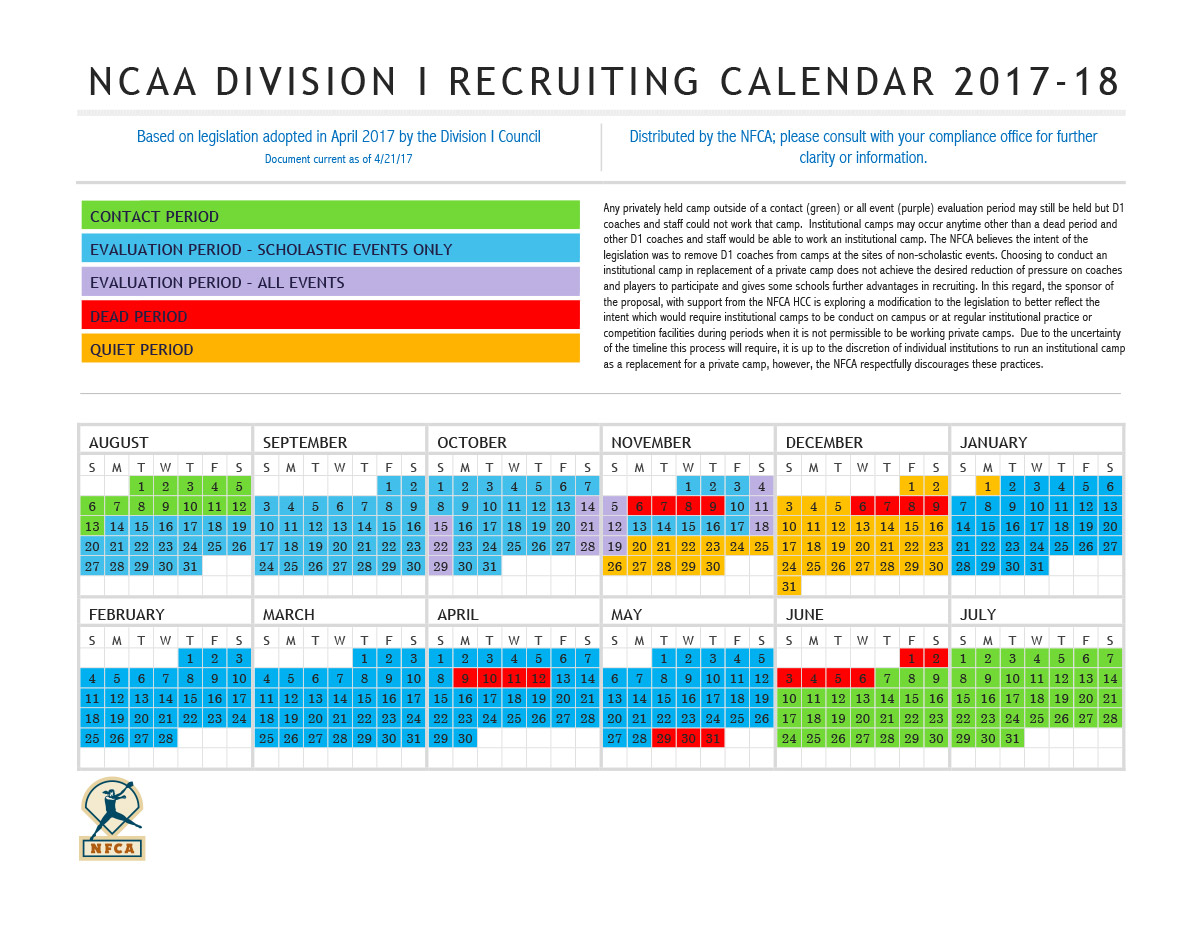NCAA Changes 2017-2018 Division I Softball Recruiting Rules & Calendar
NCAA Changes 2017-2018 Division I Softball Recruiting Rules & Calendar
The NCAA is implementing big changes to the softball recruiting landscape starting August 1, 2017.

The NCAA is implementing big changes to the softball recruiting landscape starting August 1, 2017. Early recruiting has run rampant over the last few years, and now the NCAA is looking to take preventative measures by altering the non-scholastic recruiting calendar and non-institutional camp policies.

Photo: NFCA.org
Dates are based on the 2018 NCAA Division I Women's Softball Championship. Dead period remains in effect until the day following the conclusion of the Women's College World Series. If the championship series ends after two games, the dead period ends on June 5 and the contact period would start on June 6.
**Dates are based on the 2018 NCAA Division I Women's Softball Championship. Contact period starts the day following the conclusion of the Women's College World Series. If the championship series ends after three games, the contact period starts on June 7.
During an official visit, the college can pay for transportation to and from the college for the prospect, lodging and three meals per day for both the prospect and the parent or guardian, and reasonable entertainment expenses, including three tickets to a home sports event.
The only expenses a college-bound student-athlete may receive from a college during an unofficial visit are three tickets to a home sports event.
The National Letter of Intent is voluntary and not required for a student-athlete to receive financial aid or participate in sports. Signing a National Letter of Intent ends the recruiting process since participating schools are prohibited from recruiting student-athletes who have already signed letters with other participating schools.
A student-athlete who has signed a National Letter of Intent may request a release from his or her contract with the school. If a student-athlete signs a National Letter of Intent with one school but attends a different school, he or she will lose one full year of eligibility and must complete a full academic year at their new school before being eligible to compete.

Photo: NFCA.org
Changes To Fall Ball
Fall ball recruiting will be restricted to select Saturdays and Sundays in October and November.- October 14-15, 2017
- October 21-22, 2017
- October, 28-29, 2017
- November 4-5, 2017
- November, 11-12, 2017
- November 18-19, 2017
Non-Instiutional Camp Restrictions
Softball coaches and noncoaching staff members with responsibilities specific to softball may only be employed at noninstitutional camps and clinics that occur during recruiting calendar periods when evaluation at nonscholastic practice or competition activities is permissible (See Bylaws 13.12.2.3.6 and 13.12.2.3.8).Non-Institutional Camp Dates
- October 14-15, 2017
- October 21-22, 2017
- October, 28-29, 2017
- November 4-5, 2017
- November, 11-12, 2017
- November 18-19, 2017
Contact Period
- August 1 through August 13, 2017
- June 7 through July 31, 2018
Evaluation Period (For scholastic and nonscholastic practice or competition activities.)
- August 14 through November 19, 2017 [Except for Quiet Period, Dead Period dates]
- October 14-15, 2017
- October 21-22, 2017
- October, 28-29, 2017
- November 4-5, 2017
- November, 11-12, 2017
- November 18-19, 2017
- January 2 through May 28, 2018 [Except for Quiet Period, Dead Period dates]
- During high school regional and state championship competition that does not occur during a dead period
Quiet Period
- November 20, 2017, through January 1, 2018
Dead Period
- November 18-19, 2017
- December 6-9, 2017
- April 9-12, 2018
- May 29 through June 6, 2018
- June 7 through July 31, 2018
Dates are based on the 2018 NCAA Division I Women's Softball Championship. Dead period remains in effect until the day following the conclusion of the Women's College World Series. If the championship series ends after two games, the dead period ends on June 5 and the contact period would start on June 6.
**Dates are based on the 2018 NCAA Division I Women's Softball Championship. Contact period starts the day following the conclusion of the Women's College World Series. If the championship series ends after three games, the contact period starts on June 7.
What is a contact?
A contact occurs any time a college coach says more than hello during a face-to-face contact with a college-bound student-athlete or his or her parents off the college's campus.What is a contact period?
During a contact period, a college coach may have face-to-face contact with college-bound student-athletes or their parents, watch student-athletes compete and visit their high schools, and write or telephone student-athletes or their parents.What is an evaluation period?
During an evaluation period, a college coach may watch college-bound student-athletes compete, visit their high schools, and write or telephone student-athletes or their parents. However, a college coach may not have face-to-face contact with college-bound student-athletes or their parents off the college's campus during an evaluation period.What is a quiet period?
During a quiet period, a college coach may only have face-to-face contact with college-bound student-athletes or their parents on the college's campus. A coach may not watch student-athletes compete (unless a competition occurs on the college's campus) or visit their high schools. Coaches may write or telephone college-bound student-athletes or their parents during this time.What is a dead period?
During a dead period, a college coach may not have face-to-face contact with college-bound student-athletes or their parents, and may not watch student-athletes compete or visit their high schools. Coaches may write and telephone student-athletes or their parents during a dead period.What is the difference between an official visit and an unofficial visit?
Any visit to a college campus by a college-bound student-athlete or his or her parents paid for by the college is an official visit. Visits paid for by college-bound student-athletes or their parents are unofficial visits.During an official visit, the college can pay for transportation to and from the college for the prospect, lodging and three meals per day for both the prospect and the parent or guardian, and reasonable entertainment expenses, including three tickets to a home sports event.
The only expenses a college-bound student-athlete may receive from a college during an unofficial visit are three tickets to a home sports event.
What is an Unofficial visit?
Student athletes can visit a coach on that coaches campus at anytime, as long as they pay their own way. These types of visits are called unofficial visits and have become a big part of the recruiting process.What is an Official visit?
During your senior year the NCAA allows any academic institution to pay for you to attend campus on a 48-hour official visit. Included in the visit is transportation (airfare or mileage reimbursement) to and from campus, lodging (either on campusor in a hotel), meals, and tickets to sporting events on campus.What is a National Letter of Intent?
A National Letter of Intent is signed by a college-bound student-athlete when the student-athlete agrees to attend a Division I or II college or university for one academic year. Participating institutions agree to provide financial aid for one academic year to the student-athlete as long as the student-athlete is admitted to the school and is eligible for financial aid under NCAA rules. Other forms of financial aid do not guarantee the student-athlete financial aid.The National Letter of Intent is voluntary and not required for a student-athlete to receive financial aid or participate in sports. Signing a National Letter of Intent ends the recruiting process since participating schools are prohibited from recruiting student-athletes who have already signed letters with other participating schools.
A student-athlete who has signed a National Letter of Intent may request a release from his or her contract with the school. If a student-athlete signs a National Letter of Intent with one school but attends a different school, he or she will lose one full year of eligibility and must complete a full academic year at their new school before being eligible to compete.